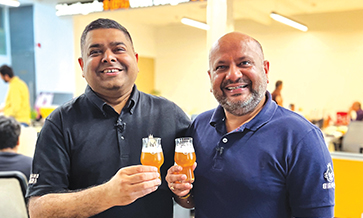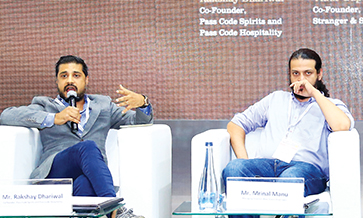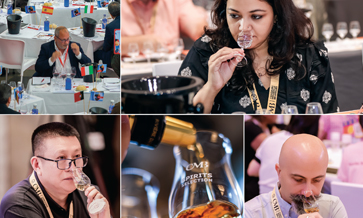India’s start-up alcohol beverage ecosystem is on a relentless growth path. From a range of single malts and gin to agave spirits, artisanal feni, craft rum, coffee liqueur – and now even India’s first absinthe! Not all these entrepreneurs have family fortunes to support their dreams. Even if they were boot-strapped at the beginning, they would need external investment for their long journey. Here’s a look-see at the people (and funds) in the shadows who are stoking these craft liquid ambitions.
In early 2006, I was in Pune for some personal work when Pratekk Chturvedi, a fellow business school alumnus, sought my counsel on his (then outlandish) new idea of a brewpub.
Pratekk and Suketu Talekar used to work in Singapore, where frequent trips to the legendary Brewerkz, contrasted sadly with their visits to India and their quest for fresh and flavourful beer. Over time, they quit their jobs and came back to India, with the hope of starting India’s first brewpub.
They were one of the very early craft beverage entrepreneurs to grapple with the Indian alcobev regulators, especially as there was no precedent for what they wished to achieve.
Fitting, therefore, that the name they chose for their venture was ‘Doolally’, drawn from the British term for Deolali in Maharashtra, home to a mental asylum. Hence the phrase “going Doolally” was akin to someone being off their rocker!
Slowly and patiently, they worked with the Maharashtra government to draft seminal legislation for the first brewpubs in India. Side by side they also had to seek funds – at a time when alcohol was still taboo, and most investors had been freshly scalded by the first dotcom bust.

For Tushar Patel, a banker-turned-investor (R), the proof was in the tipple, Maka Zai rum (L).
Star performer
It is apt to introduce Shrikant Patil: if ever there is a movie on the ‘Made in India’ alcobev story, he is sure to have a starring role for helping give birth to two ground-breaking ventures.
Shrikant returned to India from the US in 2005, after a stint of more than 15 years there, primarily as a chip designer with Intel. In 1993-94, he observed the way draught beer had begun outselling bottled beer in his home state of California. He was well aware that this was one trend from the West that would catch up in India.
Haryana picked up Maharashtra’s legislation on brewpubs and permitted the opening of Gurugram’s Howzzat (The Galaxy Hotel), most likely the first brewpub in India. Doolally (Pune) was not late to follow.
“The first mover advantage in alcobev is not necessarily advantageous. You spend your time solving more regulatory issues than actually doing business,” Shrikant recalls. Nowadays, however, “My eyes grow moist every time I enter a brewpub in Bengaluru and see how they’re flourishing!”
Once bitten though, Shrikant was hooked. His next seminal investment was in a brand called Desmondji, founded by Desmond Nazareth, a man whom I call the “Willy Wonka of Indian alcohol”.
I was part of many brainstorming sessions in his house in Altinho (Panaji, Goa) 13 years ago. Quite like the wildcatters of yore in the US who discovered oil, Desmond found the Agave Americana growing in the wild in India’s Deccan plateau. He decided to begin India’s first agave micro-distillery, and in stepped Shrikant again!
Reality check
Shrikant invested in these alcobev ventures with a time horizon for returns of 5-7 years; but those have been a long time coming. Although his exposure to Desmondji was lower than in Doolally, it is only now that the agave business has finally turned the corner, with capacities sold out and plans well afoot to double them.
What also excites Shrikant is Desmond’s newest venture: an attempt to do for Mahua, India’s tribal spirit, what the Mexicans did so successfully to Tequila. “It’s a native agricultural product,” notes Shrikant, “I’d love to be a part of the investment story if I can.”
A ringside view of India’s evolving alcohol beverage sector over the last 17 years, combined with investments in two foundational ventures, has given Shrikant a healthy reality check.
Shrikant is an investor in ventures ranging from golf courses (he just sold one!) to education. “I was conned by the ‘India Shining’ rhetoric,” he says, “Regulatory issues in the alcobev sector are quite daunting.”
The fragmented nature of alcohol beverage sales in India, with every state posing its own set of challenges, requires an army to manage the business. “It is very difficult in India to grow organically in alcohol, for small to become medium and medium to become big,” Shrikant states.
However, the silver lining for small players is innovation, he says. “When they are streets ahead of the big boys, there is the hope for a small player to be acquired by a biggie.”
Although Shrikant’s experiences haven’t always been pleasant, he retains a soft corner for the sector. He turned home brewer during the Covid-19 pandemic lockdowns. I look forward to catching up with him in Pune, and listening to his war stories over some nutty ale!
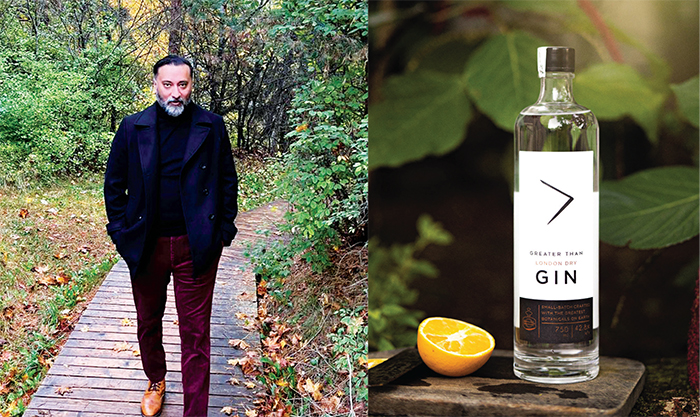
Entrepreneur Kulpreet Sahni (L) came under the juniper spell of Nao Spirits’ Greater Than (R) and Hapusa gins. With years of UK experience, he had foreseen the gin revolution in India.
Let it be gin
Perhaps there’s something about golf that connects investors in the alcobev sector in India. Amongst Kulpreet Sahni’s many and eclectic ventures and investments – from ship design to sub-sea pipelines, from fried chicken to juniper-based beauty products – is also a golf course in the UK, which is now a hotel.
In 2012-13, Kulpreet met Vaibhav Singh, a tall, bearded mixologist with many years of experience. Kulpreet became an investor in Perch, a wine and coffee bar, with early outposts in Delhi’s Khan Market and Vasant Vihar.
Enter Anand Virmani, a mild-mannered gent, who allied with Vaibhav and, fresh from his Wine and Spirits MBA in France, was advising Perch on its wine list. It wasn’t long before Kulpreet came under Anand’s juniper spell.
The seeds of Nao Spirits were planted with Kulpreet’s early first investment of Rs 20 lakh. A small still was bought, and the experiments began.
Having spent many decades in the UK, Kulpreet had seen the gin revolution come about. He was convinced that it was only a matter of time before the gin wave caught fire in India.
A gin distiller, Dr Anne Brock, was in between jobs and, like Kulpreet, came under Anand’s spell and agreed to come to India, to help create the brands that we now know as Greater Than and Hapusa.
Considering that Dr. Anne Brock is now the Master Distiller of Bombay Sapphire, and the first ever woman to be Grand Rectifier of the UK’s Gin Guild, it was an inspired choice.
When I asked Kulpreet what sparked his interest in Nao, he cited Bulldog, a brand founded by Anshuman Vohra, an ex-investment banker, and his success in signing a deal with Campari.
Global profile
“A lot of business propositions make sense,” says Kulpreet, “But in the end it’s about the execution; it’s about the individual. Anand had a gravitas to him. He was personable, knew what he was talking about and didn’t exaggerate”.
As lead investor Kulpreet helped get more of his friend’s circle in as investors. He liked the fact that it was an asset-light venture, with a small still parked in a corner of Goa’s Blue Ocean Beverages.
Unlike Shrikant’s experience, being the first mover in gin had a tremendous advantage for Kulpreet, who convinced Nao Spirits to scale up capacity and roll out craft gin Hapusa, to help build a global profile for Nao.
Nao’s is perhaps one of the first cases of a small Indian craft alcobev start-up seeing a significant stake from Diageo, which recently invested Rs 31.5 crore for a 22.5% stake. Diageo also has a call option to acquire the remaining shares on pre-agreed principles.
Apart from Hapusa, Kulpreet likes Kyro, a gin from Finland, and is fond of the clean spirit with subtle flavours that Scandinavian countries are known for.
If you see this tall, bearded man enjoying a Himalayan Negroni with Hapusa at New Delhi’s Sidecar or London’s The Connaught bar (two of his favourites), you’d be well advised to strike up a conversation with him.
House of brands
Fortunately, early-stage investing in alcobev in India is no longer new restricted to your ability to find a sugar daddy (pun intended). For what I think is the first time, we have a fund called Anthill Ventures and its sister vertical, Anthill Spirits, a dedicated play in alcohol beverages in India.
Anthill was started by Prasad Vanga, who has long work experience in tech and is an angel investor in software as a service, medical tech, etc. His ability to identify early-stage winners got his friends also interested, and thus were planted the seeds of a venture to institutionalise this.
Anthill is attempting to differentiate itself from a typical investor/ fund by not just the usual money for equity swap, but focusing on value-added activities that can help their investees build scale and access the right networks.
In media-tech, Anthill is forging an alliance with a film house in South India; and in health care it is an anchor partner with a chain of hospitals, both relationships of tremendous value to their investees!
Alcobev is of interest to Anthill as Nayanabhiram Deekonda, one of the core team tells me: it is a US$ 50-billion behemoth with a large and growing customer base. Nayan was formerly with Bira and is especially interested in the way craft spirits have taken the market by storm.
“Brands and customers are finding each other like never before! It is a true testament to the innovation and disruption launched by these players,” he says. It is this growing ecosystem that Anthill wants to be a part of, with investments in Salud (G&T), Matinee (gin) and Moonshine (mead).
Anthill provides early-stage funding. Its typical investment is Rs 1-5 crore. Apart from acting as an incubator of ideas, Anthill would also like to be seen as a “house of brands”; being the first port of call for any strategic/ institutional investors looking at the alcobev sector.
When Nayan stepped into Anthill, he assumed that he might have a couple of conversations a month. But he is pleasantly surprised by the volume of demand, and the quality of founders he’s speaking to. Around US$ 30 million is his approximation of the funding volume required for early-stage alcobev projects over the next 5 years.
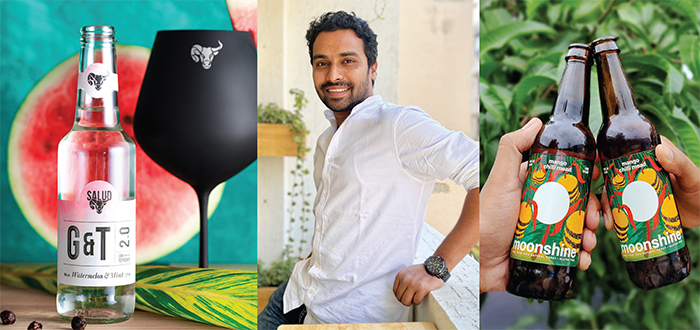
Nayanabhiram Deekonda (C) of Anthill Spirits is helping nurture the alcobev ecosystem with investments in Salud gin & tonic (L), Matinee gin and Moonshine Mead (R).
Green fields
Maka Zai is a craft rum from Goa, founded by Kasturi Banerjee, a banker-turned-bartender and brand creator, When she was seeking investment for her brand, she came into contact with Tushar Patel, a banker-turned-investor and a rum lover.
For Tushar the proof was in the tipple, and when he had his first taste of Maka Zai, he felt that it was clearly different and worth exploring! Tushar has also invested in Pune-based Moonshine Meadery.
He is driven by the logic that in India the consumer is both experimental and more affluent, a clear success path for premium brands. Tushar recognises that each sector has its own nuances, and one must recognise the role that external factors can play, as well as in the cyclicality of the business.
Serial entrepreneurs and promoters with investments in more than 100 companies, K. Ganesh and his wife, Meena, are frequent faces at Bengaluru’s Toit. They were fascinated with Goa Brewing’s People’s Lager, a brand that has hit a sweet spot with consumers.
Ganesh had been in touch with the founding team, led by Suraj Shenai, an alcobev veteran. When this particular Series-A round came up, Ganesh decided to put his money where his mouth was. He also has investments in Growth Story, Portea and Bluestone.
“The brand should have a story. Rather than advertise itself as being the best beer in the world, I’d prefer it if my friend or social media cohort tells me it’s a great beer to drink,” he says, with emphasis on brand appeal moving from push to pull.
What has also impressed Ganesh is an asset-light business model. As Goa Brewing expands to other states, they forge partnerships with breweries, on a revenue-sharing basis. This gives them the freedom to become an “IP and brand owner”.
Funds flow
A common question I ask them all is about the quantum of their investments. The range depends on the investor’s appetite and ability, and could be from Rs 10 lakh to Rs 10 crore.
They also hunt in packs, and if one scents blood then they’re quick to up the ante by bringing in more people, which also gives them more leverage with the founders.
Shrikant is quite categorical, that if you create something innovative, you would be better served by overseas markets. The others feel that the India market is big enough. Exports can be explored, though, if there is a logical reason and niche.
If you’re an alcobev entrepreneur you’ve probably read enough about what the investors are looking for. But equally important for you is to make the right choice of investor. You might not necessarily be spoilt for choice, but it’s still critical to make the right one.
If you’re fortunate enough to find someone like the people featured in this article, then that’s excellent. If you haven’t, don’t give up hope… Just make sure you find someone who loves your spirit as you do!
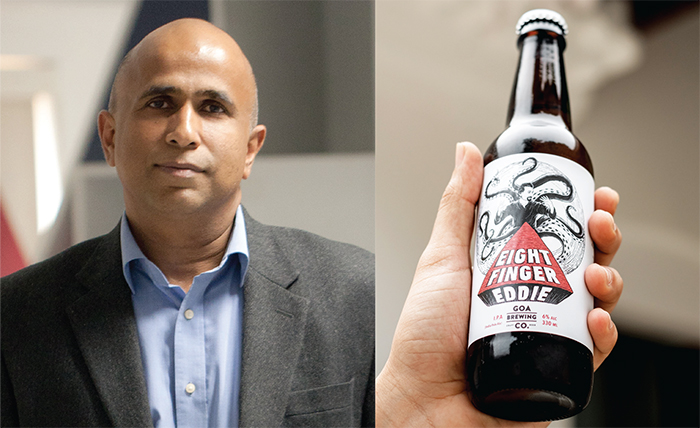
Serial investor K Ganesh (L) was fascinated with Goa Brewing (R) and its founder, Suraj Shenai, and decided to put his money where his mouth was.











